The Best Fuel Cards for Construction Fleets: What to Look for
Fuel costs are one of the greatest recurring expenses to fuelers and fleet managers in construction, not a line item. Doing it right will be the difference between a cost-effective fleet and one that is operationally drained without anyone realizing it.
This is why the correct fuel card program is not just a convenience but an important tool of operational control, cost tracking, and fraud protection.
However, your small to medium construction fleet has different requirements than over-the-road haulers. You need:
- Nationwide coverage (your job sites and yards shift all over),
- Integration with your fleet management software, and
- Granular reporting that tracks fuel by asset, crew, and usage pattern.
Here’s a breakdown of the top fuel card options for construction fleets and how to pick the one that’ll save you real money and time on the job.
What Makes a Fuel Card Work for Construction?
Let’s be clear: Not all fuel cards are built for the construction world. You don’t just want discounts at a few major truck stops, you need:
- Your fleet benefits from reduced fuel rates at every fill-up.
- Wide acceptance at retail gas stations and cardlock sites
- Ability to handle off-road diesel tracking
- Integration with telematics or maintenance platforms
- Real-time fraud detection and spend control
- Easy exports for reporting, reimbursement, or IFTA tax filing
And most importantly, your fuel card should talk to the rest of your tools, whether that’s Clue or your maintenance and accounting software.
Key Features of Fleet Cards
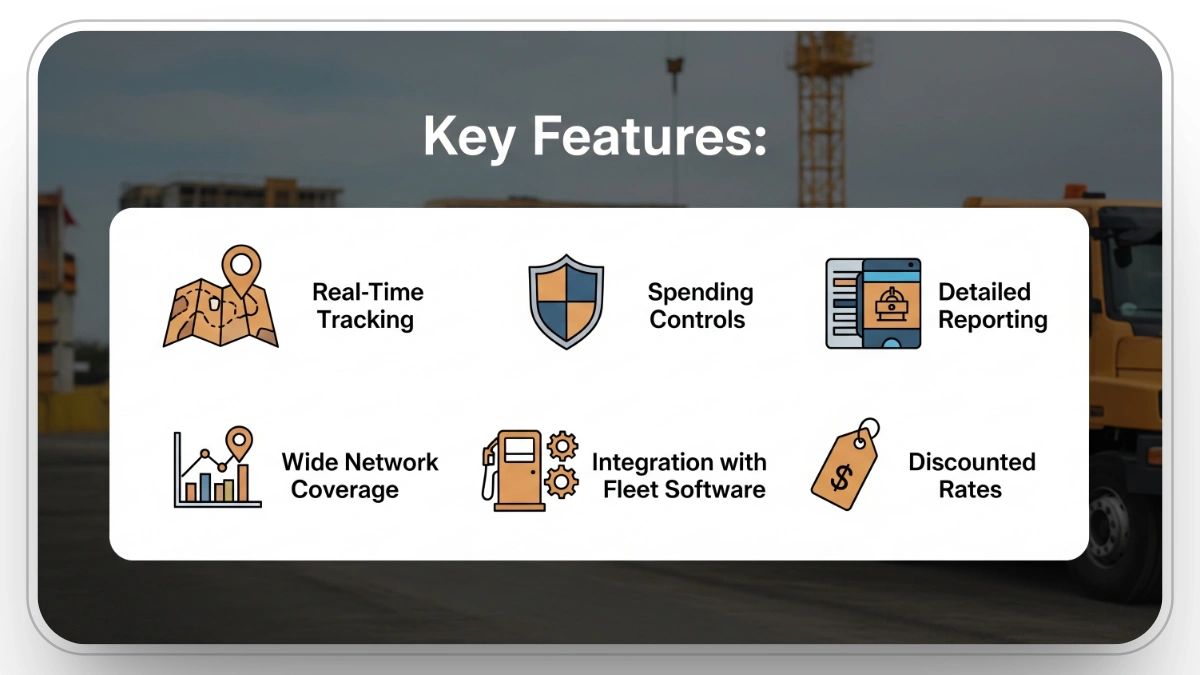
Fleet cards are more than just payment tools, they’re designed specifically for managing fuel and maintenance expenses across your fleet.
Here’s what sets them apart:
- Real-Time Tracking: Observe all the transactions in real time. Look and see who charged what, when and where, no more wondering or waiting to see the receipts.
- Spending Controls: Put restrictions on each driver, specific locations, gasoline type or time of day to avoid abuse and to ensure that the use of fuel stays within the budget.
- Detailed Reporting: Clean up with exportable data of each gallon of pumping. Perfect to audit, cost analysis and to code the job costs.
- Wide Network Coverage: Many fleet cards are also accepted at over thousands of stations across the country so that crews can refuel anywhere the work demands.
- Integration with construction fleet management software: A lot of cards are inserted in device management systems such as Clue, simplifying the ability to associate fuel spend with how it is used, how it is idle, and how it is managed during its maintenance cycle.
- Discounted Rates: Save fuel costs with the negotiated price and reduce one of your biggest operating costs.
Top Fuel Cards for Construction Fleets
Picking a good fuel card could significantly impact your spend management process, usage control, and fraud prevention at your job sites. Can not decide what to choose?
Here’s a quick cheat sheet based on your top priority:
Here’s a breakdown of the top options built for construction fleets:
1. WEX Fleet Card
.webp)
Offers: A solid promotional rate for the first 90 days, then shifts to moderate savings based on location and fuel volume.
WEX is an industry standard by virtue of being able to work in more than 95 percent of gas stations and truck stops in the United States and having its backend able to support various cards being co-branded with oil companies (Shell, Exxon, Chevron, etc.).
They provide strong reporting: keep track of gallons, type of fuel, entries on odometer, and location. This means fuel activity gets tied directly to equipment logs—critical for reconciling budgets or catching theft.
What makes WEX ideal for construction is its:
- Real-time data tracking
- Customizable spending controls by vehicle or driver
- Native integration with best fleet management and telematics systems
WEX Pros
- Massive station network
- Strong reporting + export feature
- Trusted platform with deep integrations
WEX Limitation
- ~$2/card monthly fee
- Discounts vary (1–8¢/gal, depending on volume and brand)
WEX Rating
WEX User Reviews
2. AtoB Fuel Card
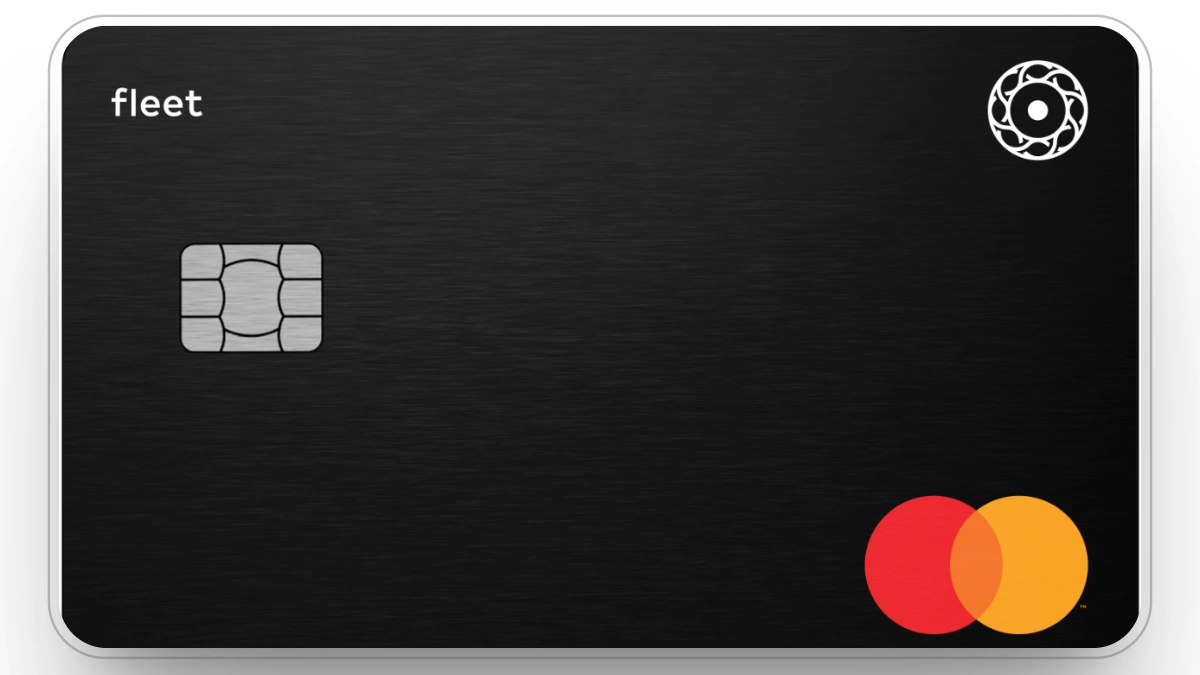
Offers: The deepest diesel rebates, often $0.42–0.45/gal with max savings reaching $2, plus a smaller discount on unleaded.
AtoB is newer to the game but purpose-built for fleet efficiency. It runs on the Mastercard network, so your team can fuel virtually anywhere and offers huge diesel rebates (up to $1.85/gal at some truck stops).
It also flags fraud using fuel-level telemetry (e.g., if the tank didn’t get filled) and can “lock” cards between jobs. It integrates cleanly with platforms like Motive, Geotab, and others.
But the real strength is data. AtoB captures:
- Fuel volume and grade
- Odometer and driver ID
- Real-time location tracking
AtoB Pros
- Best-in-class diesel discounts
- App-based driver tools and controls
- Deep telematics integration + live reporting
AtoB Cons
- $15/month base fee for 1–5 cards
- Full balance due monthly (no revolving credit)
AtoB Rating
- Not listed on TrustPilot, G2 or Capterra
3. Coast Fleet Card (Visa)
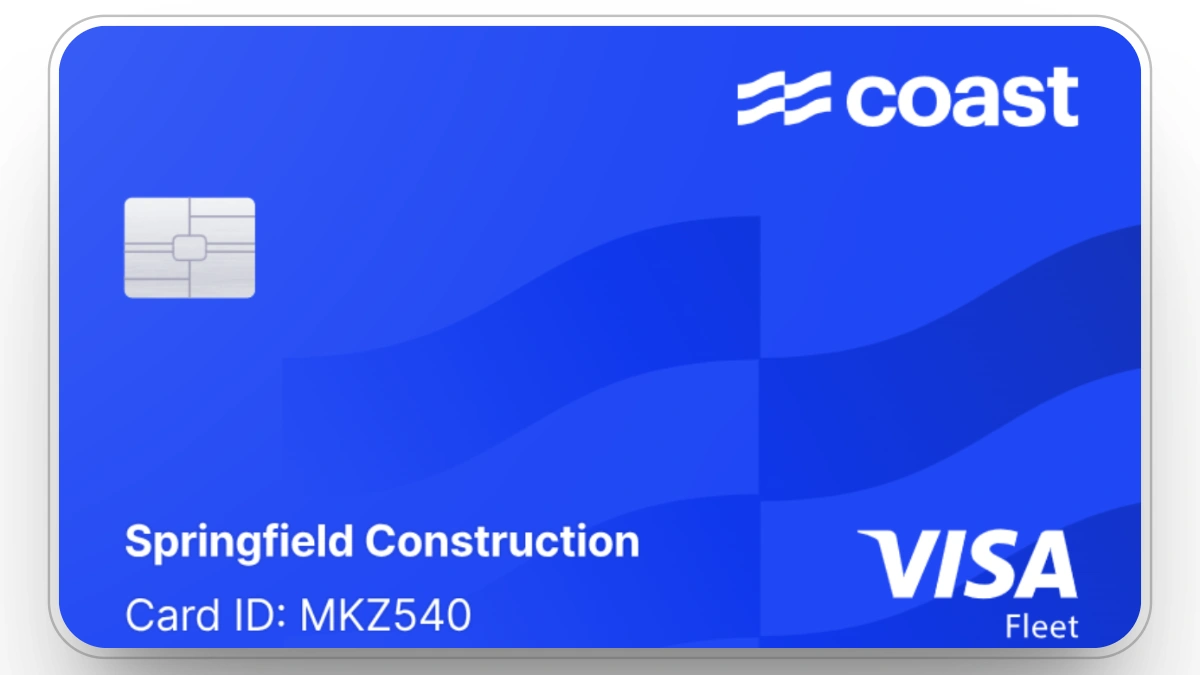
Offers: Mid-range rebates (4¢–10¢/gal) with excellent acceptance and non-fuel cashback.
The Coast card is a fleet-specific Visa card, so it’s accepted anywhere Visa is. Its discount network spans 30,000+ gas stations, but even outside that, you can still fuel up at retail pumps. If you care about clean data, fraud controls, and seamless integrations, Coast is one of the best all-in-one options, especially for smaller fleets that want simplicity.
Where Coast shines is in its modern software layer. The Coast portal and mobile app let you:
- Lock/unlock cards in real-time
- Set rules (e.g., only fuel purchases between 5am–7pm)
- Export reports that include gallons, fuel grade, driver, and price per unit
Coast Pros
- Universal acceptance
- Great UX for fleet managers
- Modern fraud controls and alerts
Coast Cons
- $4/month per active card
- 10¢/gal rebate only at partner stations
Coast Rating
Coast User Reviews
4. Fuelman Fleet Card
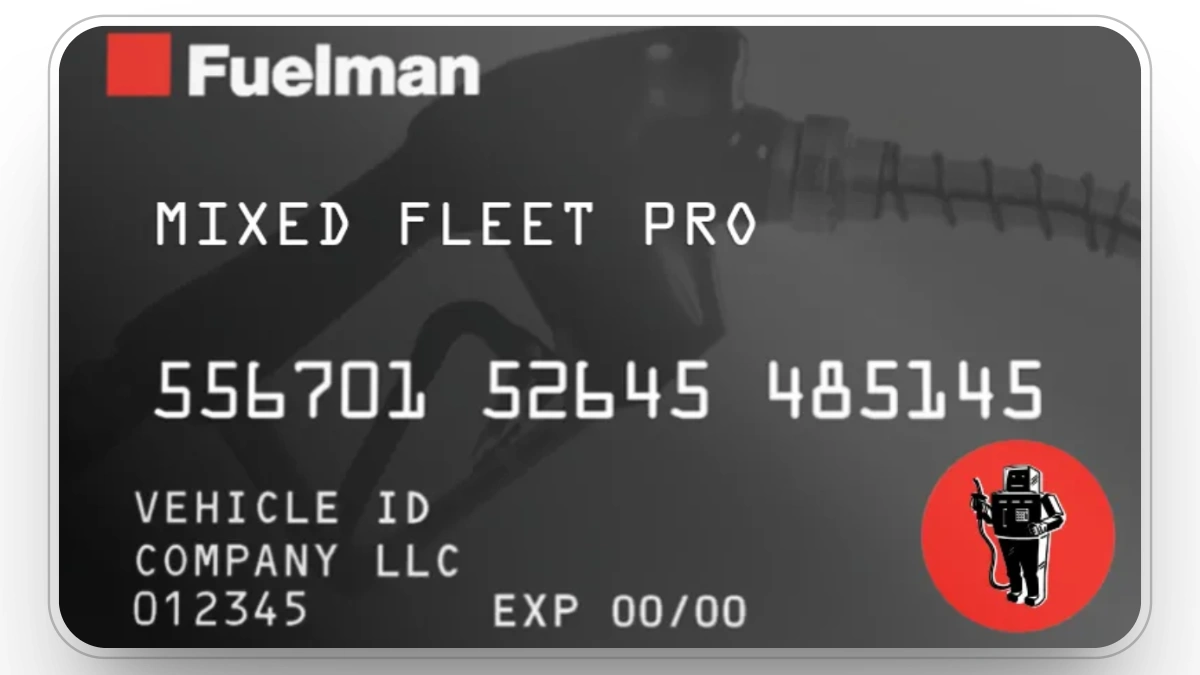
Offers: Large fleets wanting robust analytics and rebates up to 12¢/gal
Fuelman (owned by WEX) is a strong option for fleets that want to scale into deeper analytics. It's accepted at around 60,000 stations nationwide and offers detailed breakdowns by vehicle, driver, and fuel type.
Their dashboards are built for operational leaders: you get cost-per-mile, MPG tracking, tax breakdowns, and alerts when something feels off. Just be aware that Fuelman’s fees are account-based, not per-card. Plans start around $39/month and increase with features.
You can also:
- Restrict types of fuel (e.g., diesel only)
- Create rules for specific crews or sites
- Export for IFTA or accounting
Fuelman Pros
- Deep insights for large fleets
- Built-in fraud alerts and rules
- Compatible with many FMS platforms
Fuelman Cons
- Higher monthly cost for smaller teams
- Not accepted at every retailer
Fuelman Rating
- TrustPilot: 2.4/5 (Reviews 338)
Fuelman User Reviews
5. Voyager (CFN) Card
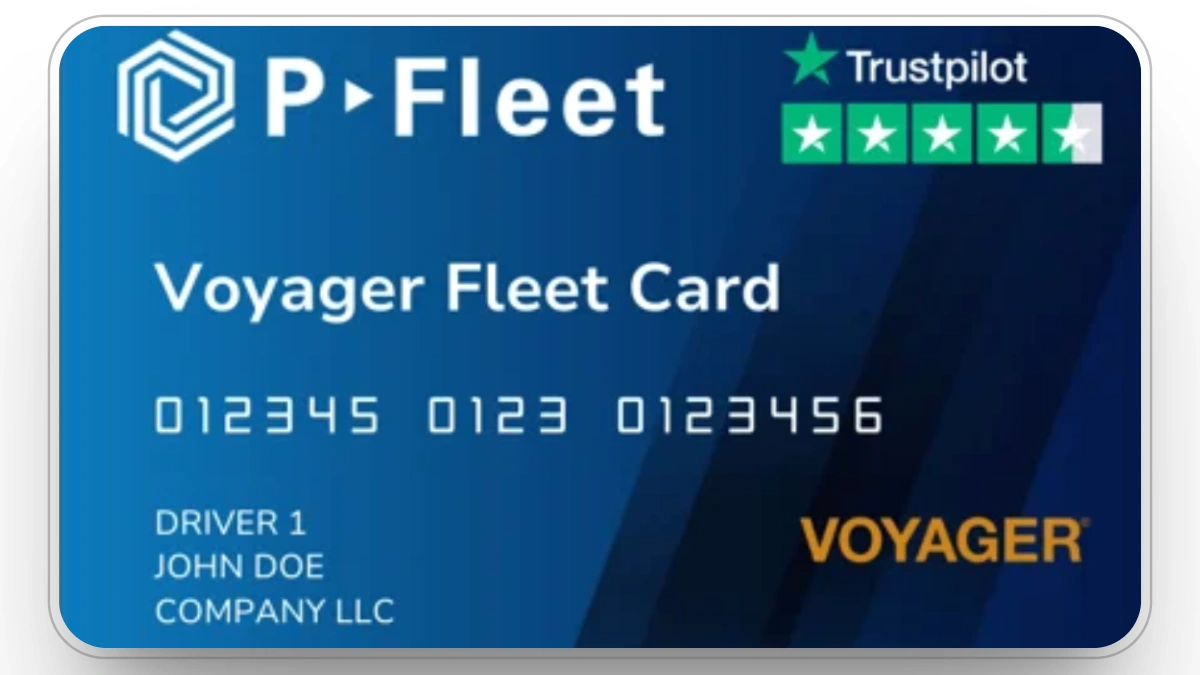
Offers: 3–8¢ per gallon savings at participating stations (including Casey’s, Cumberland Farms, Kwik Shop, Lukoil, RaceTrac, Tom Thumb, Turkey Hill, and others)
The Voyager card is issued by CFN and accepted at over 97% of stations including most truck stops and national chains. While its discounts are modest, Voyager makes up for it with its open data access and clean integration tools.
It's ideal if you're already using a telematics or fleet maintenance system and want fuel data to flow into the same platform.
Voyager Pros
- Nationwide coverage
- Real-time controls and fraud alerts
- Open API for software integrations
Voyager Cons
- Smaller discounts
- Better suited for fleets who value reporting over rebates
Voyager Rating
- Not listed on TrustPilot, G2 or Capterra
Shell Fleet Navigator & CFN Cardlock (for Off-Road Fueling)
- Shell Navigator works with the WEX network but centers around Shell stations. It offers telematics-level reporting and no monthly fees but has limited acceptance outside Shell/Mobil.
- CFN Cardlock is perfect for fleets fueling off-road equipment (e.g., diesel tanks, lube trucks). It tracks dyed diesel (non-taxed) separately and offers cost-plus pricing, which can beat pump prices by 30–40¢/gal.
Fleet Fuel Cards: Benefits and Drawbacks
Fleet fuel cards offer major advantages for construction companies managing multiple assets across job sites, but like any tool, they come with trade-offs.
Why Integration Matters
It’s tempting to chase the biggest cents-per-gallon savings. But here’s what the best construction fleet operators know: time and visibility matter more.
- If your field crews are spending 20 minutes looking for a “discount” station
- If you don’t find out about fuel theft until weeks later
- If fuel data doesn’t sync with your maintenance logs
then your so-called “fuel savings” are already gone.
By choosing a card that integrates with your fleet software, you:
- Catch red flags early (e.g., fuel volume doesn’t match tank size)
- Automate IFTA tax reporting
- Align fuel data with maintenance and usage logs
- Save your team hours of reconciliation and guesswork
Why Clue is the Best for Fuel Card Integration for Construction Fleets
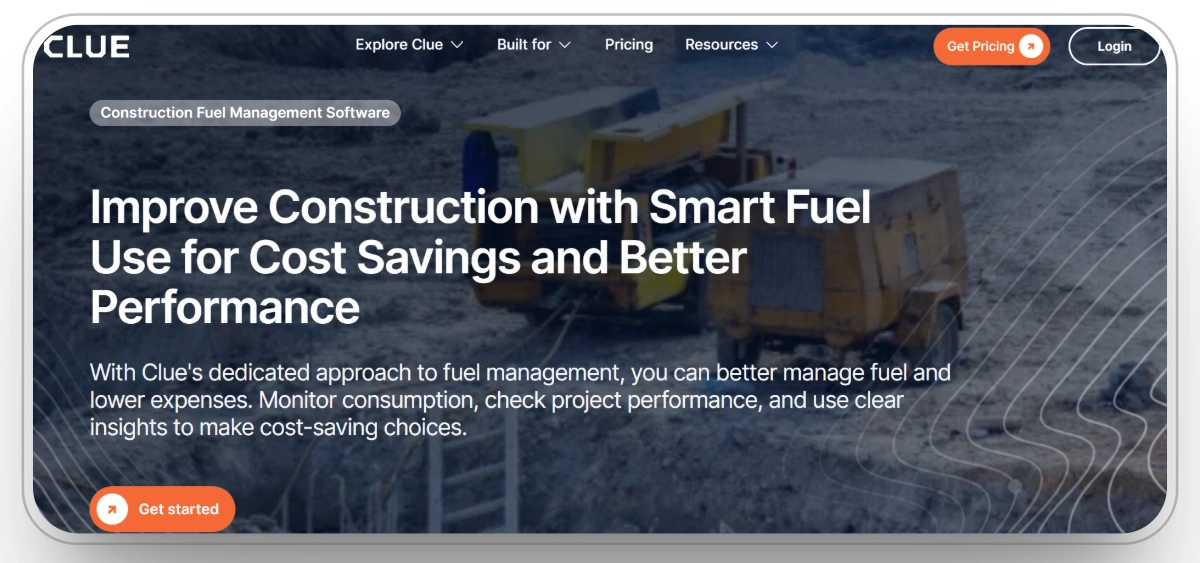
Choosing the right fuel card is only half the equation. The real value comes when that fuel data connects directly with your fleet operations. That’s where Clue leads the pack.
Clue’s fuel management software is purpose-built for construction fleets, not generic transportation or last-mile delivery. It gives you real-time visibility into fuel usage, equipment consumption trends, and job-cost impacts, all from a single dashboard.
Here’s why Clue is the ideal integration partner for your fuel card program:
1. One System for Fuel, Equipment, and Jobsite Data
Fuel shouldn’t live in a silo. With Clue, every gallon purchased gets mapped directly to the equipment that consumed it, the project it worked on, and the jobsite it supported. No more hunting for receipts or guessing which loader drained the tank.
2. Live Fuel Tracking at the Asset Level
Clue captures fuel entries in real-time via fuel card integrations, mobile entries, or direct tank readings. This means you know:
- Who fueled what
- How much was pumped
- Whether it aligns with actual engine run time and usage
This level of granularity helps you catch fuel theft, spot inefficiencies, and keep usage aligned with maintenance cycles.
3. Works with Major Fuel Card Providers
Clue integrates with top-tier fuel cards like:
These integrations automatically pull in transaction data and match it to your equipment in Clue, no manual uploads, no third-party middleware.
4. Fuel Insights Built for Field Teams
Most fuel reporting tools are built for accountants. Clue is built for equipment managers and superintendents who need to make calls fast:
- See fuel burn by machine, crew, or jobsite
- Flag abnormal usage (like excessive idle time)
- Sync fuel data with preventative maintenance and downtime alerts
5. Simplifies IFTA and Compliance Reporting
When your fleet crosses state lines or your fleet has equipment run both on road and off road, Clue automatically separates taxable vs non-taxable fuel and sorts the data you need when producing IFTA or your own internal audit.
Final Word
Fuel cards can either be a paper receipt headache or a powerful part of your equipment management stack.
If you're running a nationwide, small-to-medium construction fleet, the best cards are those that:
- Cover all your locations
- Deliver clean, real-time data
- Plug into your existing tools
- Give you eyes on every gallon
Whether you’re operating 10 assets or 200, the right fuel program brings more than savings. It brings control. Clue takes that control further by linking fuel card data directly to your equipment, jobsites, and maintenance schedules. With Clue, fuel isn’t just a cost, it’s a live metric you can act on.
Transform Your Equipment Management

.webp)










